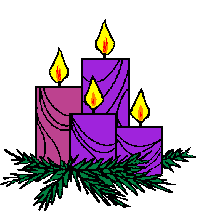 Fourth Sunday of Advent
Fourth Sunday of Advent
 Fourth Sunday of Advent
Fourth Sunday of Advent
December 19, 1999 -- 2 Samuel 7, 1-5, 11b-12, 14a, 16 + Romans 16, 25-27 + Luke 1, 26-38, O Flower of Jesse's stem!
December 20, 1999, Isaiah 7, 10-14 + Luke 1, 26-38, O Key of David, Royal Power of Israel!
December 21, 1999, Song of Solomon 2, 8-14 , Luke 1, 39-45, O Radiant Dawn, Sun of Justice!
December 22, 1999, 1 Samuel 1, 24-28 + Luke 1, 46-56, O King of all Nations, Keystone of the Mighty Arch of Humankind!
December 23, 1999, Malachi 3, 1-4, 23-24 + Luke 1, 57-66, O Emmanuel, Desire of the Nations, Savior of all People!
Pilgrimage 2000 ... Front Page ... HOME ... A Millennial Prayer
We dedicate this candle of our Advent Wreath to St. Therese of Lisieux. May her life and heroic
witness remind us of the importance of holiness in every aspect of our lives.
Last week we journeyed with John the Baptist, this fourth week of Advent might be entitled,
"Mary and the Economy of Salvation" (if, of course, one were writing a scholarly paper).
On Sunday, we read of David and the Ark of the Covenant and of the visit of the Angel Gabriel
to a young unmarried woman in a poor rural village of Galilee. From early in our history as a
Church, the Ark of the Covenant, which contained the Ten Commandments given by God to
Moses on Mt. Sinai, has been seen as relating to the role of Mary in the Incarnation. As did the
Ark of the Covenant, she carried within her the Word of God.
As the week passes, we read Isaiah's great prophecy that a virgin would conceive and bear a son,
we hear a song sung by a bride who is expecting the soon arrival of the bridegroom, we watch
Hannah dedicate her son Samuel to the service of the Lord, and on the day before Christmas Eve,
we hear prophecies of both John the Baptist and the Messiah -- and we are reminded that this
Messiah comes with a purifying refining fire.
In the Gospel readings, we walk with Mary through the Annunciation, the Visitation, the
Magnificat, and then the Birth of John the Baptist. The center of action is not someone who is
rich and cultured, but rather poor and humble. The place is not the busy streets of Jerusalem or
the halls of governance and authority in Rome, but rather the isolated rural areas of a conquered
province. The priest Zechariah, father of John the Baptist, can't speak, because he doubted the
word of the Angel Gabriel. The unmarried maiden, Mary, who believed, sang a song of victory.
God walks His way into Humanity in the company of people that, well, aren't on the A List. It is
a story of redemption for all people who believe and respond with obedience to the call of the
Lord.
Of course, all this did happen very long ago, yet even as we read these historical accounts, there
remains anticipation within because the Promise remains "in fulfillment," even as we go about
our daily journeys. The Sun of Justice has come into the world, there remain clouds which
obscure the radiance and leave us in darkness. Yet, in Mary's Magnificat, we find the hope that
"this too, shall pass." The arrogant of "mind and heart" will be dispersed, rulers will be throne
down, the lowly will be lifted up, the hungry will be filled and those who oppress them will be
sent away to learn virtue and righteousness.
Is this "pie in the sky, bye and bye" to encourage people to put up with oppression in the here and
now? Or is it inspiration to fulfill this Promise here and now? God is not the author of evil, so
these Scriptures must be given to us to help fulfill the Promise of the advent of the Sun of
Justice. Sometimes this may call us to comfort the afflicted -- to visit the poor and assist them
with both their immediate needs (and emergencies) and their long-term situation. Sometimes this
may call us to afflict the comfortable -- to visit the powerful, to call them to repentance for their
exploitation of the poor, to assist them in changing their ways and manners of living. If they do
not to hear, it may also be a call to bring the light of day to bear upon the situation, to end our
cooperation with their structures of sin, to refuse to profit from the misery of others, to actively
assist the poor in avoiding or escaping from those who would oppress them.
So we wait in anticipation, knowing how the journey goes, but remembering that part of the
Story of Christmas is that new and wondrous things do happen, joy and justice can come into the
World not just 2,000 years ago, but right here, right now, in my heart and your heart and the
hearts of billions of other human beings. We are all called by God into loving community with
each other, we might as well start practicing, otherwise we'll never get good at it.
May the Advent spirit of anticipation and preparation cultivate within us open and loving hearts
of justice, and may our daily actions reflect that inner peace!
Pilgrimage 2000 ... Front Page ... HOME ... A Millennial Prayer